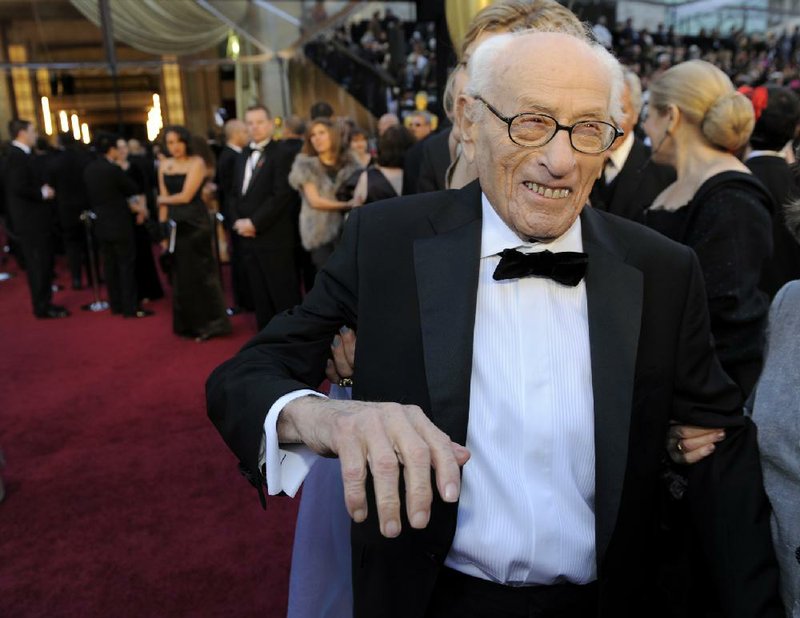Eli Wallach, a celebrated stage and film actor who excelled at playing impulsive characters across the ethnic spectrum, memorably as Mexican bandits in the 1960s movie westerns The Magnificent Seven and The Good, the Bad and the Ugly, died Tuesday at 98.
His daughter, Katherine Wallach, confirmed the death to media outlets but did not disclose the cause.
The son of Polish Jews, Wallach was in constant demand to play nearly every kind of ethnic character onstage and screen in a career that spanned seven decades. He initially burst to prominence on Broadway, where he won a Tony Award for his portrayal of a prideful and buffoonish Sicilian named Mangiacavallo in Tennessee Williams' The Rose Tattoo (1951).
Wallach became one of the busiest character actors in Hollywood, with more than 150 credits in films and on television. He portrayed a Cambodian warlord in Lord Jim (1965), based on a Joseph Conrad novel; the Shah of Khwarezm opposite Omar Sharif in the title role of Genghis Khan (1965); and a candy-loving mobster in The Godfather: Part III (1990).
Reviewers singled out Wallach for praise as a villain in The Magnificent Seven (1960), a high-profile Hollywood remake of Akira Kurosawa's Seven Samurai that featured Yul Brynner, Steve McQueen and Charles Bronson.
Wallach also had a pivotal role in Italian director Sergio Leone's violent "spaghetti western" The Good, the Bad and the Ugly (1966). His character, Tuco, was the "Ugly."
Wallach's other movie highlights included a psychopathic hit man in Don Siegel's The Lineup (1958) and a sad-eyed widower who elicits more sympathy than attraction from divorcee Marilyn Monroe in The Misfits (1961).
New York Times film critic Bosley Crowther found Wallach "dynamic, arrogant and droll" as the Sicilian who ruins his scheming rival (played by Karl Malden) in Baby Doll (1956), based on two short plays by Williams.
Wallach performed in more than two dozen Broadway shows since the 1940s -- several opposite his wife, actress Anne Jackson. He earned a reputation as a skilled interpreter of modern playwrights, including the absurdist Eugene Ionesco (Rhinoceros) and the comic writer Murray Schisgal (Luv). He was an early member of the Actors Studio, a workshop in New York founded by director Elia Kazan, producer Cheryl Crawford and other prominent theatrical figures.
As a performer, Wallach drew from "the Method," an acting technique that uses the performer's emotional memory to add realistic touches to a role.
On television, he won an Emmy Award for a supporting role as a Mafia drug dealer in the drama The Poppy Is Also a Flower (1966), and joked that he received fan mail for decades for his guest role as Freeze on the campy 1960s TV series Batman.
Eli Herschel Wallach, whose father was a tailor, was born Dec. 7, 1915, in Brooklyn, N.Y. As a youngster, he was captivated by comics and dramatized the strip panels using different voices. This led to his interest in movies and acting, a passion cemented after watching Ronald Colman in the 1926 silent film version of Beau Geste.
He won a scholarship to study acting at the Neighborhood Playhouse, a theater school in Manhattan that taught "the Method," but his professional stage career was delayed by Army Medical Corps service during World War II.
In 1946, he met Jackson when they appeared together in a Williams one-act play, This Property is Condemned. They married two years later. Besides his wife, survivors include three children, according to the Los Angeles Times.
Wallach's big break onstage came when director Joshua Logan hired him as a replacement for a supporting actor in the wartime comedy Mister Roberts, starring Henry Fonda.
Despite promising movie roles early on, Wallach was gradually reduced to supporting parts, but he often made the most of limited screen time.
He played a wounded American soldier in The Victors (1963); an art collector opposite Audrey Hepburn in How to Steal a Million (1966); a Jewish bail bondsman in The Hunter (1980), McQueen's final movie; and a hit man after aged robbers Kirk Douglas and Burt Lancaster in Tough Guys (1986).
He also played an unbilled role of a liquor store owner in Clint Eastwood's Mystic River (2003). He had known Eastwood ever since both suffered through director Leone's demands on the set of The Good, the Bad and the Ugly.
Wallach, who in recent years had small roles in films such as Roman Polanski's The Ghost Writer and Oliver Stone's Wall Street: Money Never Sleeps, received an honorary Academy Award for lifetime achievement in 2010. The citation called him "the quintessential chameleon, effortlessly inhabiting a wide range of characters, while putting his inimitable stamp on every role."
A Section on 06/26/2014

